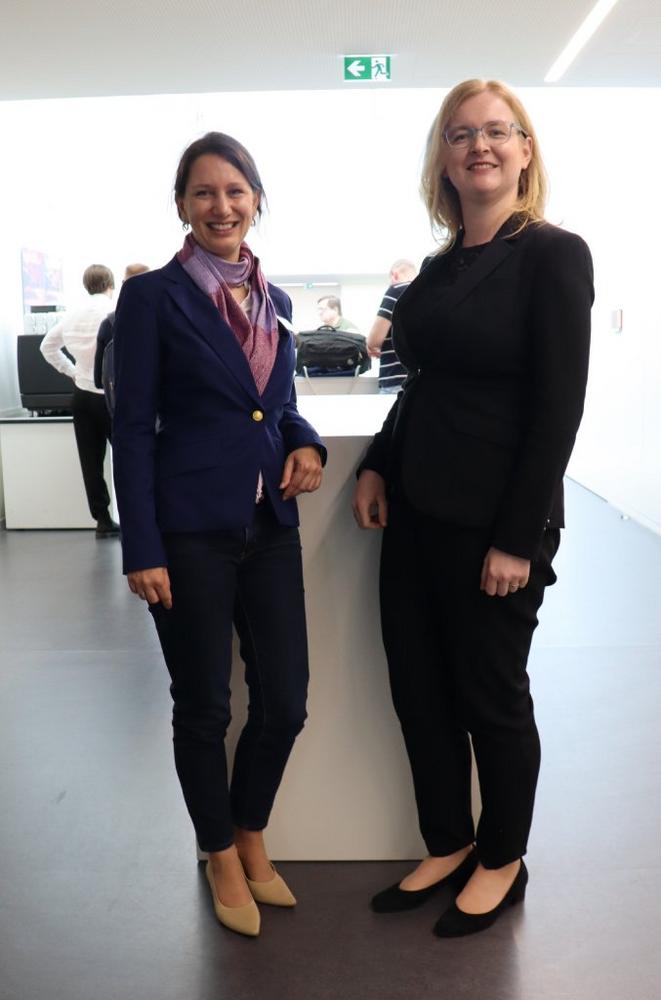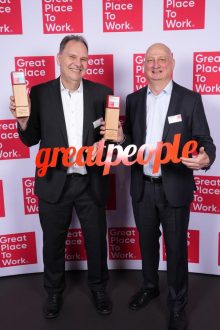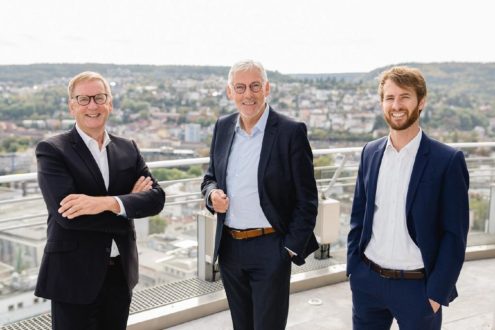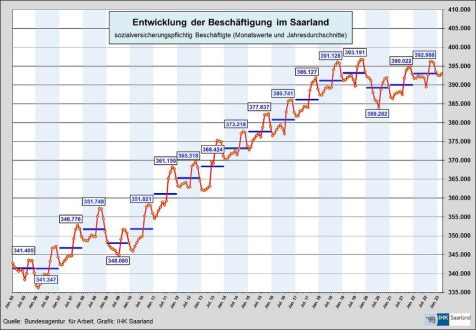
Synergies Instead of Silo Mentality
The guests who gathered in the conference rooms of the auditorium on Bildungscampus Heilbronn were mainly young scientists and doctoral students. They all share a passion: BPM and EA. The event in figures: 36 participants, including Vienna, Mannheim, Groningen, Bayreuth and, of course, Heilbronn. There were 22 presentations in which 17 papers were discussed, some of which ventured beyond the boundaries of their own disciplines. Luise Pufahl, Professor of Information Engineering, is delighted with the variety of topics: “With our program, we are providing new impetus for research ideas, but also benefiting from high-caliber keynotes from industry and research.”
Small Circles, Huge Opportunities
One of these keynotes served as the starting signal for the discussion rounds. Professor Han van der Aa from the University of Vienna presented a summary of a wide range of thoughts on this topic, as his former colleague Jana-Rebecca Rehse noted with a wink. It became clear that the BPM and EA community is relatively small. While conferences in other IT research fields attract thousands of participants, BPM and EA conferences sometimes have only 200 or fewer people presenting their work. Van der Aa does not see this as a disadvantage: “The opportunities for collaboration are huge; others will notice your work and develop it further.”
However, it is important to leave your own discipline and look beyond your own horizons, says van der Aa: “We have to take developments in related fields of research into account, otherwise we’ll just be reinventing the wheel.” To avoid silo thinking, new initiatives should be launched with cross-functional teams. The focus should be on applications that are relevant to society. At the same time, the “old hands” can serve as role models and mentors for young academics. The “Women in Process Mining” program, for example, offers a platform specifically for female researchers.
Creating and Exploiting Synergies
The participants then split into two conference rooms, where they presented their current research projects. One of them, Johannes Mäkelburg, a doctoral candidate at TUM Campus Heilbronn, wanted to leverage the synergies between different disciplines. Together with his doctoral supervisor, Data Engineering Professor Maribel Acosta, he is researching knowledge graphs. Knowledge graphs represent knowledge in a structured way by describing information about things such as people, places, or organizations and their connections to one another. A prominent example are the grey information blocks on Google, where information is provided in condensed form. The doctoral student is also achieving remarkable results in the field of error analysis for digital invoices. His program can check e-invoices within 30 seconds, whereas manual analysis takes 30 minutes. Mäkelburg, who is actually from a different field, is enthusiastic about the BPM workshop: “The general openness is very commendable. Here, I gain insights into research in other disciplines.”
A total of nine sessions were on the program, ranging from process analytics and digital twins to AI in process modelling. The ninth session dealt with a highly topical issue: sustainability. Michel Medema from the University of Groningen conducts research into sustainability based on the triple bottom line approach.. Sustainability should be implemented as a key value in business processes – in economic, ecological and social terms. Among other things, he wants to develop an emissions calculator. The workshop gave him new impetus: “I only switched to this field of research a year ago and can network perfectly here.”
Big Ambitions and a Small Flaw
At the closing event, the two organizers drew a thoroughly positive conclusion. “When we started planning, we had an idea, a vision, but we weren’t sure if it would work,” said Jana-Rebecca Rehse, adding: "We have created a forum for knowledge that will benefit young scientists in particular.” Luise Pufahl agrees. “Everything went smoothly. And in addition to the professional exchange, our guests were able to get to know and appreciate the city.” Her colleague from Mannheim sees room for improvement in only one area: “I see a lot of ambition in Heilbronn, but the train connection could be better,” she says with a laugh.
The next EMISA workshop will take place on 10 and 11 March next year in Bayreuth.
Die TUM Campus Heilbronn gGmbH
Bildungscampus 2
74076 Heilbronn
Telefon: +49 (0) 7131 264180
Telefax: +49 (7131) 645636-27
https://www.chn.tum.de/de
Telefon: +49 (7131) 26418-501
E-Mail: Kerstin.Besemer@tumheilbronn-ggmbh.de
![]()




